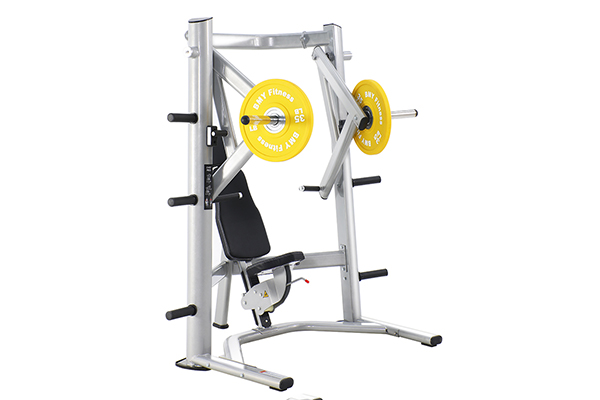Hongxing is a company that specializes in selling commercial gym exercise equipment. No matter what kind of fitness equipment you want to buy, you can contact him!
Seated Chest Press vs. Bench Press: Debating the Effectiveness of Two Key Chest Exercises
In the realm of strength training, the bench press and seated chest press stand as two cornerstone exercises for developing chest strength and muscle mass. While both exercises target the pectoralis major, triceps, and anterior deltoids, they differ in their movement patterns, muscle engagement, and potential benefits. As a result, a common question arises among fitness enthusiasts: can seated chest press replace bench press?

Comparing Movement Patterns and Muscle Engagement
The bench press involves lying on a flat bench with feet firmly planted on the ground and pressing a barbell or dumbbells upwards from the chest. This movement allows for a full range of motion and engages the pectoralis major, triceps, and anterior deltoids in a coordinated manner.
In contrast, the seated chest press involves sitting in a supported position with a backrest and pressing weight upwards from the chest. This movement restricts the range of motion and places more emphasis on the pectoralis major, with less involvement of the triceps and anterior deltoids.
Benefits of Seated Chest Press
The seated chest press offers several advantages, including:
-
Reduced stress on shoulders: The seated position can minimize stress on the shoulders, making it a suitable alternative for individuals with shoulder pain or injuries.
-
Increased focus on pectoralis major: The seated position isolates the pectoralis major to a greater extent, allowing for more focused development of this muscle group.
-
Easier to learn: The seated chest press is generally considered easier to learn than the bench press due to the supported position and reduced range of motion.
Benefits of Bench Press
Despite the advantages of the seated chest press, the bench press remains a staple in strength training programs for several reasons:
-
Greater range of motion: The bench press allows for a full range of motion, which can promote greater muscle growth and strength gains.
-
More comprehensive muscle engagement: The bench press engages a broader range of muscles, including the triceps and anterior deltoids, contributing to overall upper body strength development.
-
Functional movement: The bench press mimics movements involved in everyday activities, such as pushing objects or lifting oneself off the ground.
Can Seated Chest Press Replace Bench Press?
The answer to this question depends on individual goals and preferences. For individuals with shoulder pain or limited mobility, the seated chest press can serve as an effective alternative to the bench press. However, for those seeking optimal chest strength, muscle growth, and overall upper body development, the bench press remains the gold standard.
Conclusion
Both the seated chest press and bench press offer unique benefits and can be valuable additions to a strength training program. The choice between the two exercises should be based on individual goals, fitness level, and any physical limitations. For those aiming to maximize chest strength and overall upper body development, the bench press is generally recommended. However, for individuals with shoulder issues or those seeking a more isolated chest workout, the seated chest press can be a suitable alternative. Ultimately, incorporating both exercises into a well-structured program can provide a comprehensive approach to chest muscle development and overall strength training.
Post time: 11-22-2023



